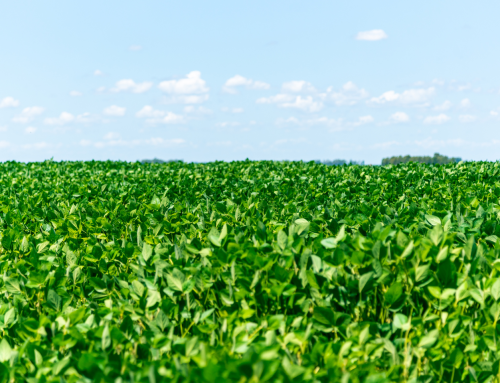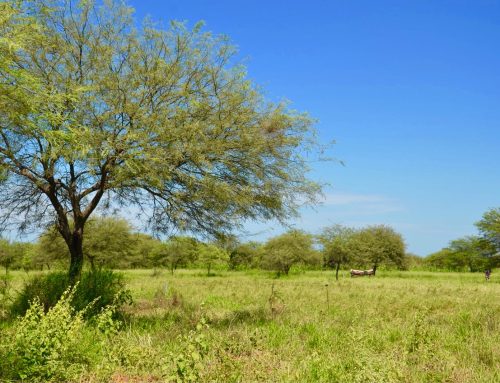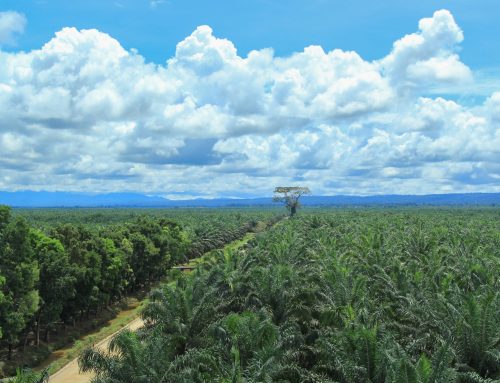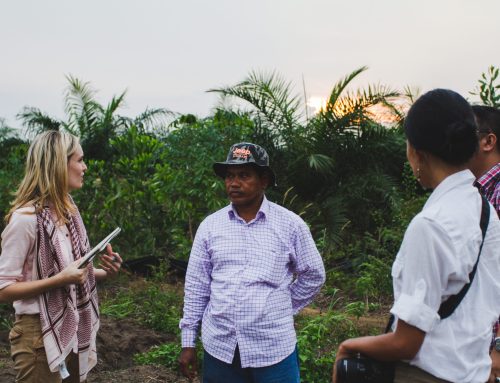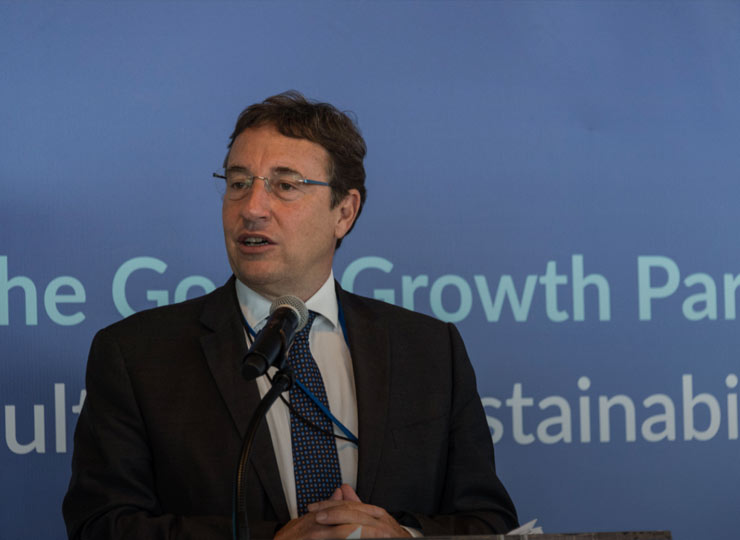
UNDP Administrator, Achim Steiner, delivers a keynote address during the launch of the Good Growth Partnership on September 6, 2017.
Originally published by the United Nations Development Programme
Ministers, distinguished speakers, colleagues and friends.
I am delighted to be here at the launch of the Good Growth Partnership, an ambitious effort to place sustainability at the heart of commodity production.
Please join me in thanking our co-hosts and supporters from the Global Environment Facility. It is not least due to the GEF’s vision and leadership that we are here today to launch one of their flagship initiatives.
It is a pleasure to have this opportunity to address such a diverse group of actors, all of whom have a stake in how we choose to produce key agricultural commodities. This cross-sector dialogue to collaborate is integral to successfully address pressing need to reduce deforestation and improve the way we produce food in a globalized and growing world.
I would like to use this opportunity to talk about the tremendous opportunities involved in promoting sustainable agriculture and how we can take advantage of these by working closely with all stakeholders along the commodity supply chain, from the producers to government and market actors.
So what are the opportunities?
There are approximately 2.6 billion people – or around a third of the world’s population – who depend on agriculture for their livelihoods. Many are small-scale, subsistence farmers who live in rural areas and are vulnerable to market fluctuations and shocks.
Sustainable agriculture can serve as an engine for rural growth across vast areas, improving the lives of millions of people, inevitably tackling persistent poverty on a large scale and nourishing a growing world.
Indeed, experience shows that increasing farm yields and return on labor, while at the same time improving ecosystem services — on which the poor depend most directly for food and livelihoods — will be key to addressing poverty and food insecurity, as well as reducing the need for further forest encroachment.
How do we take advantage of these opportunities?
Those of you here today are fully aware of the difficulties involved in promoting more sustainable agriculture production.
When your aim is as ambitious as overhauling the way we produce, consume and finance agriculture commodities the very idea can seem overwhelming. But it’s important to take a step back and consider what has already been achieved, by many of you here, including the commodity roundtables, the Consumer Goods Forum commitments to zero deforestation and the global commitments through the New York Declaration for Forests.
And now, we can see the progress to date, cumulate in what we are celebrating here today – the launch of the Good Growth Partnership.
Ten years ago, who would have expected that some of the world’s most important agricultural exporters, biggest players in conservation and development, as well as major multinational companies and the farmers who supply to them, would not only be engaged in constructive dialogue but embarking on a groundbreaking and transformative partnership.
A partnership that will begin to lead the way in reimagining the production of the world’s agricultural commodities, with the aim of benefitting all those involved, not least the environment.
I think this is a testament to the fact that despite whatever challenges we are facing a transformation is unfolding.
The Good Growth Partnership, initiated by the GEF, and now led by the UNDP’s Green Commodities Programme, in strong collaboration with Conservation International, the International Finance Corporation, UN Environment and World Wide Fund for Nature, focuses on the root causes that lead to deforestation, environmental degradation and unsustainable commodity production overall.
By targeting three key sections of the global commodity supply chain — production, demand and financing — the Programme pursues a holistic approach, helping to bring about lasting change.
Where production is concerned, the Good Growth Partnership will build on the work of national governments and implementing partners, to systemically change the way commodities are produced, with the aim of increasing productivity without expanding into forests. This will be achieved through convening diverse stakeholders around a common vision and agenda for action; and by backing governments to fortify their support to farmers, and to reform laws, policies as well as enforcement systems.
On the demand side, and building on WWF’s long and successful outreach and campaigning history, the Good Growth Partnership will advocate for sustainably produced beef, palm oil and soy, targeting consumers, policy makers, companies and investors. This will be done in coordination and cooperation with existing initiatives, as well as the media. The ultimate objective is to increase supply chain transparency, build awareness and drive demand for sustainable commodities in key consumer markets, with a particular focus on Asia.
Targeting the financial sector, UN Environment together with the World Bank’s International Finance Corporation will work closely with banks and financing institutions to help make capital more accessible for businesses adopting a sustainable approach to commodity production, as well as for farmers and producers who require finance to invest in more environmentally sound practices.
UNDP’s role
In leading this groundbreaking Partnership, UNDP’s role will be twofold:
First, to coordinate efforts across its three different strands – production, demand and finance – and to ensure the impacts are greater than the sum of the parts; and
Second, to lead the sustainable production efforts at the country level, working in particular in partnership with Conservation International and WWF.
Considering the majority of rural developing economies are dependent on agriculture commodities, the agricultural sector has long been a central focus UNDP’s work.
A good example is the Green Commodities Programme, launched in 2009 to support governments promote sustainability — particularly on the production front — through national and provincial level multi-stakeholder commodity platforms.
Across Latin America, Asia and Africa — these national commodity platforms have opened-up new channels for dialogue, as well as newfound understandings and opportunities for collaboration and coordinated investments between donors, companies, NGOs and farmers.
Through this work, we help create an environment where partnerships between the private and public sectors can grow. We also provide technical expertise and coordination support to improve landscape management, land use planning and monitoring, as well as improved extension services for farmers.
We are very pleased that this work will now be integrated into the Good Growth Partnership, and with the support of GEF financing, we will be working together with partners to promote sustainable production, demand, and financing of beef, palm oil, and soy. We are also particularly excited that the governments of Brazil, Indonesia, Paraguay and Liberia have agreed to be our national partners in this endeavor.
Conclusion
In conclusion, let me just emphasize how promising the partnership we are launching here today is.
Indeed, if we get it right, it has a real potential to tackle some of the greatest challenges of our time, including those identified in the 2030 Agenda and its commitment to “leave no one behind.”
UNDP is fully committed to this Partnership, and to support countries to pursue the path of sustainability.
We look forward to working together in collaboration with other Good Growth partners – WWF, Conservation International, the IFC, UN Environment and the GEF – to this end, and urge others – businesses, organizations and stakeholders – to join us in critical this effort.


